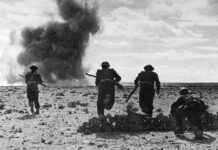“I don’t know when the Russians arrived (in the village), but I only know one thing, that’s what I saw yesterday, or the day before yesterday, I saw a Ukrainian soldier and I I was relieved,” she said, still moved, in front of her house, to an AFP journalist.
“We understood that the Russians had left because our soldiers were driving by. I had tears of happiness, that Ukraine was finally liberated,” she adds.
“I asked our soldiers yesterday, is it victory already? Can we open the champagne? We tried to think positively,” says the 43-year-old mother, who lost her teenage daughter in a bombardment on the village. .
Pravdyne is about twenty kilometers northwest of Kherson, annexed at the end of September by Moscow, which had been the first major city to fall after the Russian invasion launched at the end of February, and was liberated on Friday, signing a major setback for Moscow.
The village, located in the middle of an agricultural plain, had more than a thousand inhabitants before the war. About 180 never left it. Several houses were destroyed, like the school, noted AFP.
On Saturday, volunteers came by van to distribute food aid. Two ladies hugged each other crying.
Viktor Galak, 44, Svitlana’s husband, recounts the mistreatment inflicted by Russian soldiers during the occupation. One day, he wanted to go and see with a neighbor how his mother, who lived in another part of the village, was doing.
“The Russians stopped us and forced us to our knees. I refused and asked if they were fascists. And the (soldier) replied: No, the fascists are on the other side (…) We are liberators, “says Viktor Galak.
“They asked me for my passport. But I didn’t give it, why would I have it on me. And they asked me: Are you from here? What street are we on? J I named the street where we were, but they asked me the next street, but I didn’t know it,” he continues.
– Hands and feet tied –
He says a soldier came up behind him and shot him near his feet. Then they forced him to lie on the ground. “They tied my arms and legs. Then one of them came and said he was going to put a grenade under me so I wouldn’t run away.”
He then tells them that his daughter has already been killed and asks them, “Why do you want to put a grenade under me? Do you want to kill us all or what? What is your aim? Are you fascists?”
One of the Russian soldiers then “put a grenade under me and they told me not to move because otherwise I was going to explode”. Shortly after, they took him by car to be interrogated in a place where another soldier recognized him, because he had already passed him in the street, and he was released.
“We were happy when we saw Ukrainian soldiers, because we are Ukrainians”, explains Viktor Galak, according to whom the occupation was also difficult because he had no money and “no food to buy”.
According to him, “the Russian soldiers brought sweets, cans, food and everyone took it because no one wanted to starve.”
He also adds that the occupants “didn’t want to fight. They were sitting, not very happy to stay here, not to be with their families.”
“We don’t want them to come back and shoot everyone. Let us live like before. We lived in bad conditions but that was Ukraine,” he said.
According to Svitlana Striletska, 50, a school director and assistant to the Pravdyne council, 23 people were killed in the village, where electricity and gas were cut off in early March.
With her husband, she “provided people with humanitarian aid. We had our little factory to make butter, sunflower oil. We also had a tractor. The Russians destroyed everything because we were helping people”, she recalls.
Svitlana Striletska and her husband stayed only a few weeks in Pravdyne, because one day, she says, “I will never forget it, a man from the village ran up to us and said to me: You must run away, because they (Russian soldiers) are looking for you. And I knew I had to choose between being killed or fleeing.”








